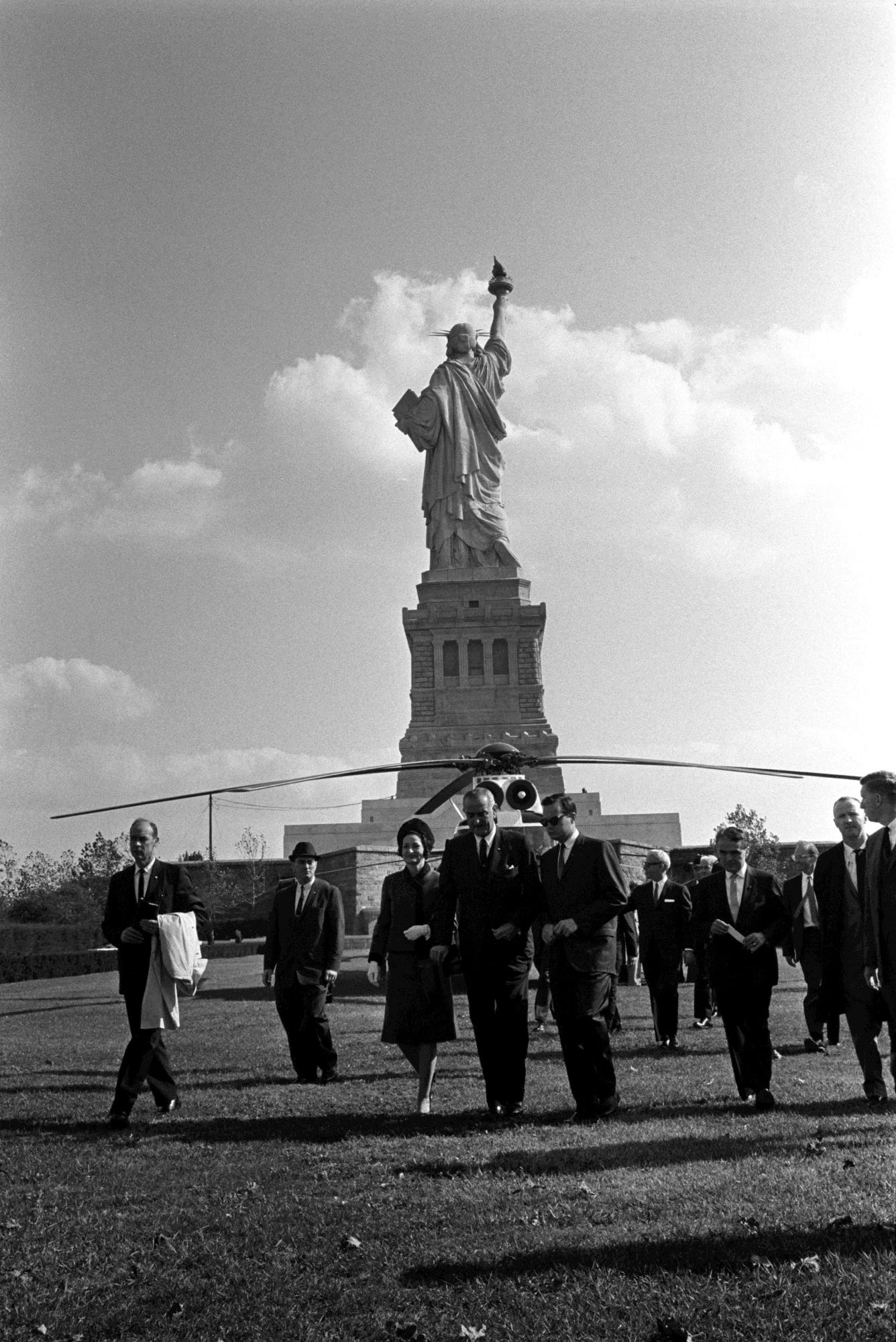
This Day in Legal History: Formal Immigration Quotas End
On October 3, 1965, President Lyndon B. Johnson signed the Immigration and Nationality Act into law, marking a significant shift in U.S. immigration policy. This legislation, also known as the Hart-Celler Act, abolished the national origins quota system that had been in place since 1924, which favored European immigrants and limited others. Johnson, during a ceremony at the Statue of Liberty, called the old system "un-American" and discriminatory. The new law established a more equitable process, allowing a set number of immigrants from each country with no preference based on nationality.
The Act also prioritized family reunification and skilled labor, changing the face of American immigration by allowing greater numbers of immigrants from Asia, Africa, and Latin America. Though the total cap on immigration was still in place, the changes sparked a demographic transformation that led to the multicultural U.S. society seen today. This law was part of Johnson's broader Great Society program, aimed at promoting civil rights and social reforms. Despite fears at the time that it would open the floodgates for immigration, the Act is now regarded as a key milestone in modernizing U.S. immigration policy.
On November 5, 2024, eight U.S. states will vote on constitutional amendments to ban noncitizens from voting, even though it is already illegal. These states include key swing states North Carolina and Wisconsin, as well as Republican strongholds like Idaho, Iowa, and South Carolina. Supporters of the measures argue they address concerns over illegal immigration and the integrity of U.S. elections. Critics, however, view this as part of a broader effort by Donald Trump and his allies to undermine confidence in the electoral process. They fear it could be used to challenge the results if Trump loses the presidential election.
While some localities allow legal noncitizens to vote in municipal elections, noncitizen voting in federal elections remains illegal. Independent studies and election officials from both parties confirm that noncitizen voting is rare. Nonetheless, Trump's repeated claims of widespread illegal voting, especially from immigrants, have fueled distrust among his supporters, despite a lack of evidence. These ballot measures follow ongoing lawsuits and legislative attempts by Republicans to tighten voter registration rules.
Eight US states to vote on amendments to ban noncitizen voters | Reuters
The U.S. Supreme Court will address several key employment law issues in its upcoming term. One significant case, Williams v. Washington, questions whether workers must exhaust state administrative remedies before filing federal civil rights claims in state court. Another case, Lackey v. Stinnie, will explore whether securing a preliminary injunction in civil rights litigation qualifies a plaintiff as a "prevailing party" entitled to attorney's fees.
In Medical Marijuana Inc. v. Horn, the justices will consider if a truck driver can use the RICO Act to sue a CBD manufacturer whose mislabeled product allegedly caused him to fail a drug test and lose his job. This case hinges on whether job loss qualifies as an economic injury under RICO.
Additionally, the Court will evaluate the burden employers must meet when proving workers are exempt from federal overtime requirements in EMD Sales Inc. v. Carrera U.S.. The case could affect how easily employees can claim overtime pay under the Fair Labor Standards Act.
Lastly, Stanley v. City of Sanford will clarify whether the Americans with Disabilities Act (ADA) protects former employees against discrimination in post-employment policies. This decision could impact how employers handle benefits for disabled ex-workers.
Justices to Hear Cases on Drug Tests and Ex-Worker ADA Rights
The U.S. Securities and Exchange Commission (SEC) has appealed a court ruling that ordered Ripple Labs Inc. to pay a $125 million civil penalty for improperly selling its XRP token, far less than the $2 billion the SEC initially sought. The lawsuit, filed in 2020, accused Ripple of illegally raising funds by selling XRP without registering it as a security. The case is significant for the cryptocurrency industry, as it could shape the SEC's authority over digital assets.
In a 2023 ruling, U.S. District Judge Analisa Torres determined that XRP sales to institutional investors were subject to securities laws, but those to retail investors were not, a decision seen as a win for Ripple and the broader crypto sector. While the SEC sought nearly $2 billion in penalties and disgorgements, Torres only imposed the smaller civil penalty. Ripple's CEO, Brad Garlinghouse, criticized the SEC’s persistence in the case, claiming it harmed the agency’s reputation and did not protect investors.
The SEC, however, maintains that the decision contradicts long-standing Supreme Court precedent and securities law, prompting its appeal.
SEC Appeals $125 Million Judgment in Ripple Labs XRP Lawsuit (1)
Prosecutors have argued that Donald Trump should stand trial for his efforts to overturn the 2020 election, emphasizing that his actions were those of a private citizen, not protected by presidential immunity. A newly unsealed court brief details Trump’s pressure on former Vice President Mike Pence to intervene in the certification of Joe Biden’s victory. The filing also recounts how Trump dismissed concerns for Pence’s safety during the Capitol riot with a remark of "So what?" when informed that Pence was in danger.
The filing reveals prosecutors' intention to use swing-state officials, iPhone data, and private conversations to demonstrate Trump’s knowledge that his fraud claims were false. They contend Trump continued to pursue election interference despite being informed by close advisors, including Pence, that his claims were baseless. Additionally, the government will argue that Trump, as a candidate, pressed state officials to reject Biden’s win, despite having no official role in the electoral process.
Trump’s defense has focused on his communications with Pence, suggesting these might be protected by presidential immunity. However, the prosecution asserts that Trump’s conduct, including his pressure on Pence, was part of a private scheme, not covered by immunity guidelines.
Trump Said ‘So What’ When Told of Pence Peril on Jan. 6, US Says












